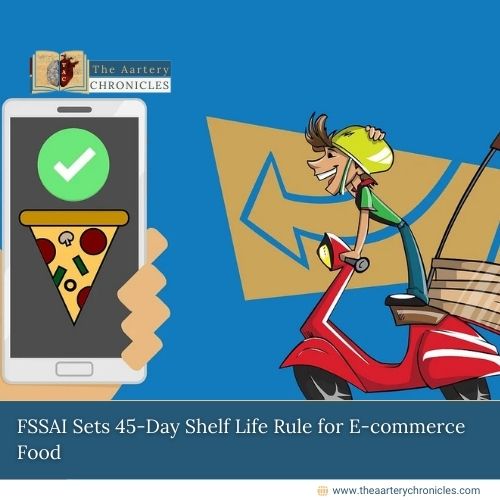

FSSAI Sets 45-Day Shelf Life Rule for E-commerce Food
Introduction
The Food Safety and Standards Authority of India (FSSAI) has issued new guidelines to safeguard consumer health by ensuring that food delivered by e-commerce platforms meets minimum shelf life requirements. These guidelines, directed at major e-commerce food companies like Swiggy, Zomato, and BigBasket, are designed to enhance food safety standards and promote responsible practices across the industry.
Minimum Shelf Life Standards for Food Products
During a recent meeting with e-commerce food business operators (FBOs), FSSAI mandated that all food products listed on e-commerce platforms must have a minimum remaining shelf life of either 30% of their total shelf life or at least 45 days before expiry, whichever is shorter. This directive aims to prevent the sale and delivery of products nearing expiration, thus ensuring that consumers receive food items in optimal condition.
Emphasis on Accurate Product Information and Transparency
The FSSAI CEO, who chaired the meeting attended by over 200 participants (both in person and virtually), also highlighted the importance of transparent and accurate product information. E-commerce platforms were warned against making misleading claims about food products, which can erode consumer trust and potentially endanger health. Accurate labelling and honest advertising are now top priorities, reinforcing a consumer-centric approach within digital food marketplaces.
Mandatory FSSAI Licensing for E-commerce Sellers
To strengthen regulatory compliance, the FSSAI reaffirmed that all food business operators must possess a valid FSSAI license or registration to operate on any e-commerce platform. This requirement ensures that only certified and compliant sellers can participate in the e-commerce food market, adding a layer of consumer protection.
Training for Safe Food Handling and Delivery
Another focus area highlighted by FSSAI is the need for safe food handling practices throughout the delivery process. E-commerce FBOs are now required to train their delivery personnel in essential food safety and hygiene protocols. This training will help prevent contamination risks, contributing to the safe delivery of food products to customers.
To further prevent cross-contamination, FSSAI directed platforms to deliver food and non-food items separately. This additional measure aligns with broader food safety goals, ensuring that consumers receive products handled with the highest standards of hygiene.
No Compromise on Food Safety for Quick Delivery Services
Addressing the recent trend of expedited delivery services, such as 10-minute deliveries, FSSAI clarified that these platforms must not compromise food safety standards to meet rapid delivery demands. All e-commerce operators are expected to adhere to existing safety norms regardless of delivery speed.
With these new guidelines, FSSAI aims to bolster consumer trust in e-commerce food platforms by ensuring safe, fresh, and accurately represented food items for every purchase.
Source: Inputs from various media Sources

Priya Bairagi
I’m a pharmacist with a strong background in health sciences. I hold a BSc from Delhi University and a pharmacy degree from PDM University. I write articles and daily health news while interviewing doctors to bring you the latest insights. In my free time, you’ll find me at the gym or lost in a sci-fi novel.








